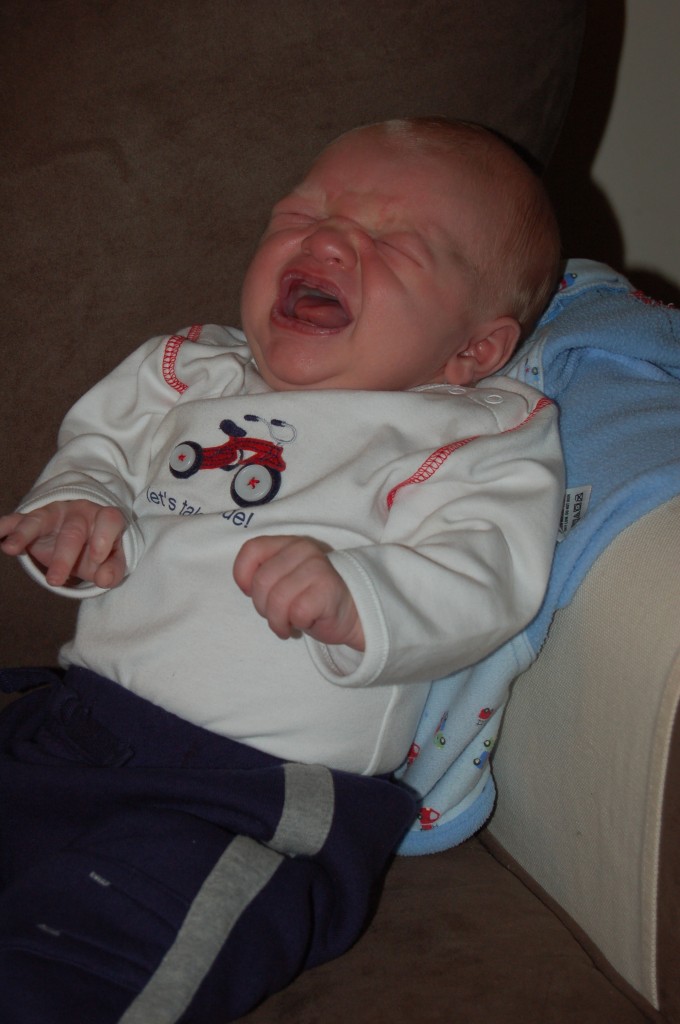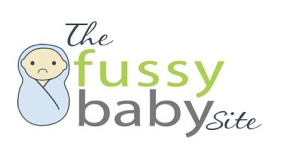A Story of Colic and Guilt (and Some Ways to Manage the Guilt)
It’s been a few years since we were at the height of our son’s fussiness, and admittedly, much of what we went through has started to fade from our memories. I honestly didn’t think it ever would, as it was one of the most difficult things either my husband and I had ever been through.
I would never have imagined that something as common as colic could impact a family to such an extent. Had I not experienced it firsthand, I would probably still have no clue.
And it wouldn’t have occurred to me that guilt could play such a major factor. Colic, crying, fussiness – it’s so common! An estimated 20% of babies have colic. So why on earth would a parent feel guilt over this? Obviously colic is not caused by anything we are or aren’t doing as parents. Obviously.
Yet not obvious at all when it’s happening to you.
The Condensed Story of Our Encounter with Colic

Sammy was born on a stormy November night after a very civilized and manageable labour. Immediately after his birth, the crying (screaming) started. He latched on immediately which was a blessing, but every time I’d try to take him off and put him down he’d start up again. I remember nursing him for hour upon hour, and then finally the both of us falling asleep on the hospital bed. I also remember the nurse waking us up to move him to his crib, and the screaming starting again (I will never forget that nurse!).
Within a few days, it became very obvious to us that Sammy wasn’t going to be the baby we dreamed of having. Our first child, a daughter, had been a bit fussy, and we thought maybe this time, being that we were more experienced and more relaxed, we would get our easy baby.
But from the very beginning, everything seemed to be a challenge with Sammy. He slept in very short stretches, and this only after elaborate soothing routines that involved everything but standing on our heads. When he woke up, there was no cooing or gurgling, only screaming. I wanted to exclusively breastfeed, but it was proving to be a huge challenge. He seemed to want to nurse, only to arch his back, screaming, and push away after a few seconds. It was hard to know whether perhaps I wasn’t making enough milk, whether I had too much milk, or whether he was reacting to something I was eating.
When he was awake, he was screaming. Our days were spent walking, carrying, bouncing, jiggling, strolling, driving, swinging, soothing, and feeding. Forget standing still! Literally the only reprieve we had was when he was asleep and for 10 minutes at night during his evening bath.
To be honest, many of the memories of those days have faded for me. While I know the memories (largely through sharing them on a daily basis through this site), the feelings have faded. I am thankful for that, because they were some of the most gut-wrenching feelings I have experienced.
One of the most salient memories, however, is of the guilt. Absolutely overwhelming, utterly all-consuming, guilt. Guilt that I carried as a physical sensation during Sammy’s first few months. Yes, I was exhausted, sleep-deprived, and beyond frustrated. However it was the guilt that almost got me.
Guilt because my baby was crying and seemed to be in pain, and that I might be somehow causing it. Guilt that I didn’t know my own child well enough to know what was wrong with him. Guilt that my 2.5 year old daughter was having to listen to the screaming and wasn’t getting the attention she deserved. Guilt that I didn’t feel a connection with my own baby, and that I didn’t know if I truly loved him. Guilt that sometimes I wished he had never been born. I wanted the crying to stop and to get on with normal life. THAT was my main concern.
I wish I could tell you how I got over that guilt, because that would be a very helpful piece of info. I don’t think there was anything I did that helped, except the passing of time and Sammy getting better.
Looking at the guilt now 4 years in the past and out the other side, I do have some tips for managing (not getting rid of) the guilt. Take them for what they’re worth.
3 Ways to Manage Guilt When You Have a Fussy, Colicky or High Need Baby
- Tell yourself you’re doing the best you can in this situation with the resources you have. It’s a well established fact that what we think and what we tell ourselves, influences not only our mood but also our actions. When feelings of guilt start to creep into your mind, make a conscious decision to tell yourself you’re doing the best you can in this less-than-ideal situation. Do not allow your mind to continue down the road of self-flagellation, even for a moment. Give yourself a mental pat on the back, and go easy on yourself. In a perfect world, you’d be handling things differently, for sure. But this is not a perfect world, and you’re doing the best you can with what’s been put on your plate.
- Talk about your guilt with a trusted friend or spouse. Guilt will eat you up. Its insidious. Guilt is a natural human condition that’s meant to keep us on the right track. In your situation, it’s misplaced and inappropriate. This is NOT your fault. Bring the feelings of guilt into the light by sharing it with a friend or your spouse. If you don’t have anyone you can talk to, come tell us (or comment below).
- Carve out time to spend with your other children, away from your baby. Kids are so incredibly resilient, and especially if they’re very young, they won’t even remember this time. But if you can get someone you trust to watch your baby from time to time, spend some quality one-on-one time with your other child(ren). Your kids will appreciate it, and when you start to feel guilty about not giving them enough attention, you can remind yourself that you are doing everything you can.
What can you add to this list? Have you struggled with feelings of guilt? What advice would you give other parents dealing with this issue? Tell me in the comments below!
Other Posts You May Like
How to be a Good Facebook Group Member (and Online Citizen)
Best Products for Fussy Babies
50+ Best Toys & Products for Spirited Kids, 0-5: Christmas Gift Guide
“Why are You So Tired?”: Here’s Why New Moms Are Walking Zombies
A Possible Treatment Or Cure For Colic?
